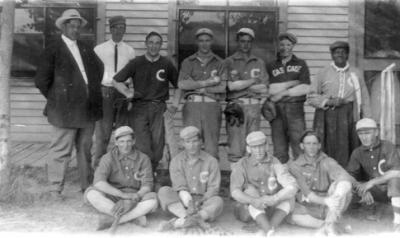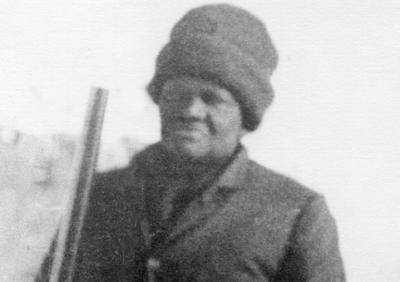Stagecoach Mary
Photos courtesy of Wedsworth Library
The image of sweat-flecked horses hauling a teetering stagecoach down a dirt road is a classic when recounting Montana’s early days. But if this particular coach was held up in a notorious Wild West robbery, the outlaws were in for a surprise. The six-foot-tall, 200-pound driver whipping out a six-shooter wouldn’t be the cowboy they were expecting. Instead, they would have been face-to-face with mail coach driver, former slave, and formidable woman Mary Fields.

Mary Fields — better known as Stagecoach Mary — was born a slave in Hickman County, Tennessee, around 1832. While she didn’t know her exact birthday nor enjoy the liberties of a free woman until her adult years, Mary was still luckier than others born into slavery. She learned to read and write, and her fierce, competent nature were well known in the area.
Details of Mary’s early life are vague. Despite varying accounts, it is known that Mary was close with blond-haired, blue-eyed Sarah Theresa Dunne, whose friendship eventually drew Mary to the West. After being freed in 1865, Mary traveled through the Midwest and along the Mississippi River, staying in touch with Sarah the entire time.
Mary’s travels brought her to the convent where Sarah was living as a nun. When sisters from the convent journeyed west to open a boarding school in Montana, Mary’s story really took off. Montana was the perfect place for this powerhouse of a woman. She enjoyed the company of gritty men over delicate ladies, drinking whiskey from the flask in her apron pocket over sipping tea, and using her ham-size fists to inform people not to cross her.

There are many tall tales surrounding Mary’s time at the school, and her eventual rise to crew foreman. A commonly circulated story involves an altercation with a worker, who did not appreciate working under a black woman. The argument got physical, and as the worker reached for his pistol, Mary whipped out her six-shooter and fired before his hand could leave his pocket. Aside from her proficiency with firearms, Mary was a spitfire when it came to her work. As one nun famously remarked, “May God help anyone who walks on the lawn after Mary has cut it.”
During Mary’s time, women in the West were still battling prejudice — but they still had more freedom and duties than anywhere elsewhere in the country. The demands of creating a viable life on the frontier had men (perhaps grudgingly) accepting women’s expanding roles. In many outposts on the western frontier, the ratio of men to women was 100 to 1.
This meant that the women were defaulted into higher responsibly than their female counterparts back East. While Stagecoach Mary was an extreme example of expanded women’s roles, women in the West were breaking barriers every day. With fewer people and more labor demands, these tough frontier women were expected to rise up and take on more responsibilities in a difficult new land.

With the higher demand on each citizen of the frontier, a strapping woman like Mary, who can wield a six-shooter, mend a fence, and drive a horse-drawn coach through inclement weather and hostile territory would have been a valuable amenity to any community. While Mary’s skills and domineering personality were already stoutly in place, the environment out West afforded her the opportunity not just to take on expanded roles, but to be valued and cherished for her unconventional contributions to the community.
Regardless of whether she was aware of it, Mary was a pioneer for women’s expanding societal roles. Most of the women’s suffrage movement was taking place back on the East Coast, but women out West were pioneering a different kind of independence. Mary was too busy was running stagecoaches and wielding pistols 50 years before women were even allowed in the polling booths. She didn’t have time to stand on a soapbox.

Driving a U.S. Postal Service stagecoach is the role Mary Fields is most famous for. She was only the second woman employed by the U.S. Postal Service, and the first black woman. When envisioning a career in high-risk, labor-intensive fields, working for the U.S. Postal Service isn’t the first thing that springs to mind. But in the Wild West, Stagecoach Mary wasn’t driving a truck along suburban streets and handing out dog treats to the neighborhood pooch.
The weight of an empty nine-passenger Concorde — the typical Western mail coach — was 2,400 pounds. Aside from maneuvering a massive wagon and controlling a team of six flighty horses, postal drivers had to fight both the weather and the outlaws. Montana is not known for consistently good skies, and Mary drove her coach through blizzards, snowdrifts, baking heat, and across swollen rivers. Driving a stagecoach filled with valuable goods through lawless territories wasn’t for the faint of heart, but attempting to rob Mary’s stagecoach wasn’t either. Her skills with her .38 Smith & Wesson were legendary, and she bragged her gun “could cut a man in half at close range.” Dressed in a man’s overcoat with a pistol under her apron and a jug of whiskey by her feet, Stagecoach Mary would clang into tiny frontier outposts. With her knack for driving horses and her don’t-mess-with-me attitude, the mail on Mary’s coach always got where it was going.

One famed night, a pack of wolves frightened Mary’s team of horses, and the coach flipped on its side. Taking shelter behind the overturned vehicle, Mary held the wolf pack off all through the night, armed with her pistol and shotgun. When daybreak hit, Mary was still alive, and the mail delivery intact.
No matter how tough you are and how groundbreaking your story, everyone’s got to calm down eventually. By the time she retired from her postal route, Stagecoach Mary was a beloved member of the community. She was the Cascade Baseball Team’s biggest fan, creating buttonhole rosettes for each player on the team and giving out full bouquets for players who hit home runs. The town of Cascade respected Mary to the lengths that they closed the schools down each year on her birthday to celebrate the occasion. She was well over 80 years old when she passed away.
Mary’s accomplishments might not have been possible had she stayed back East. Labor needs were more easily met, and the attitude towards women assuming more responsibility wasn’t as lenient. Her astounding personality would not have had the historical impact that it does from the life she led out West, and she remains one of the most dominating pioneers — male or female — to live on the western frontier.
Did Stagecoach Mary singlehandedly progress the rights and freedoms of women on the frontier? Probably not. Was she the toughest, brawniest, most respected Montana woman to swill whiskey, drive a mail coach, and sponsor her local baseball team? Yes. Definitely.